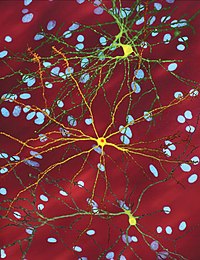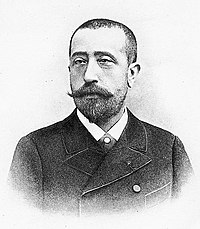
Treatment Responsiveness of Parkinsonism in Atypical Pantothenate Kinase‐Associated Neurodegeneration
Sign Up to like & getrecommendations! Published in 2020 at "Movement Disorders Clinical Practice"
DOI: 10.1002/mdc3.13056
Abstract: Pantothenate kinase-associated neurodegeneration (PKAN) is a rare progressive autosomal recessive disease caused by mutations in the PANK2 gene. PANK2 encodes a pantothenate kinase, an enzyme involved in coenzyme A production. The clinical presentation of PKAN… read more here.
Keywords: pantothenate kinase; pkan; kinase associated; associated neurodegeneration ... See more keywords

Clinical rating scale for pantothenate kinase‐associated neurodegeneration: A pilot study
Sign Up to like & getrecommendations! Published in 2017 at "Movement Disorders"
DOI: 10.1002/mds.27129
Abstract: Pantothenate kinase‐associated neurodegeneration is a progressive neurological disorder occurring in both childhood and adulthood. The objective of this study was to design and pilot‐test a disease‐specific clinical rating scale for the assessment of patients with… read more here.
Keywords: pantothenate kinase; clinical rating; kinase associated; associated neurodegeneration ... See more keywords

Clinical course of patients with pantothenate kinase-associated neurodegeneration (PKAN) before and after DBS surgery
Sign Up to like & getrecommendations! Published in 2019 at "Journal of Neurology"
DOI: 10.1007/s00415-019-09499-3
Abstract: Pantothenate kinase-associated neurodegeneration (PKAN) is a rare autosomal recessive disorder with a progressive clinical course. In addition to symptomatic therapy, DBS has been increasingly recognized as a potential therapeutic strategy, especially in severe cases. Therefore,… read more here.
Keywords: improvement; pantothenate kinase; pkan; dbs ... See more keywords

Discovery of Novel 1,3-Diphenylpyrazine Derivatives as Potent S-Phase Kinase-Associated Protein 2 (Skp2) Inhibitors for the Treatment of Cancer.
Sign Up to like & getrecommendations! Published in 2023 at "Journal of medicinal chemistry"
DOI: 10.1021/acs.jmedchem.2c01675
Abstract: F-box protein S-phase kinase-associated protein 2 (Skp2) is a component of cullin-RING ligases, which is responsible for recruiting and ubiquitinating substrates and subsequently plays its proteolytic and non-proteolytic role. High expression of Skp2 is frequently… read more here.
Keywords: skp2; phase kinase; protein skp2; protein ... See more keywords

Cannabis Use in Children With Pantothenate Kinase–Associated Neurodegeneration
Sign Up to like & getrecommendations! Published in 2019 at "Journal of Child Neurology"
DOI: 10.1177/0883073819890516
Abstract: Background: Pantothenate kinase–associated neurodegeneration is characterized by severe, progressive dystonia. This study aims to describe the reported usage of cannabis products among children with pantothenate kinase–associated neurodegeneration. Methods: A cross-sectional, 37-item survey was distributed in… read more here.
Keywords: cannabis; pantothenate kinase; kinase associated; associated neurodegeneration ... See more keywords

Phenotypic expression and founder effect of PANK2 c.1583C>T (p.T528M) mutation in Serbian pantothenate kinase-associated neurodegeneration patients
Sign Up to like & getrecommendations! Published in 2019 at "Archives of Biological Sciences"
DOI: 10.2298/abs181227009s
Abstract: Pantothenate kinase-associated neurodegeneration (PKAN) is an autosomal recessive disorder characterized by dystonia, parkinsonism, cognitive and visual impairment, and iron accumulation in the brain. Many cases of PKAN result from mutations in the PANK2 gene that… read more here.
Keywords: pantothenate kinase; pank2 1583c; founder; kinase associated ... See more keywords

Study design challenges and strategies in clinical trials for rare diseases: Lessons learned from pantothenate kinase-associated neurodegeneration
Sign Up to like & getrecommendations! Published in 2023 at "Frontiers in Neurology"
DOI: 10.3389/fneur.2023.1098454
Abstract: Substantial challenges in study design and methodology exist during clinical trial development to examine treatment response in patients with a rare disease, especially those with predominant central nervous system involvement and heterogeneity in clinical manifestations… read more here.
Keywords: study design; rare disease; pantothenate kinase; disease ... See more keywords

Typical pantothenate kinase-associated neurodegeneration caused by compound heterozygous mutations in PANK2 gene in a Chinese patient: a case report and literature review
Sign Up to like & getrecommendations! Published in 2023 at "Frontiers in Neurology"
DOI: 10.3389/fneur.2023.1170557
Abstract: Pantothenate kinase-associated neurodegeneration (PKAN) is a rare genetic neurodegenerative disorder with brain iron accumulation characterized as dysarthria, spasticity, cognitive impairment, parkinsonism, and retinopathy. PKAN is caused by biallelic mutations in the mitochondrial pantothenate kinase 2… read more here.
Keywords: associated neurodegeneration; pank2 gene; pantothenate kinase; kinase associated ... See more keywords

Small-molecule compounds inhibiting S-phase kinase-associated protein 2: A review
Sign Up to like & getrecommendations! Published in 2023 at "Frontiers in Pharmacology"
DOI: 10.3389/fphar.2023.1122008
Abstract: S-phase kinase-associated protein 2 (Skp2) is a substrate-specific adaptor in Skp1-CUL1-ROC1-F-box E3 ubiquitin ligases and widely regarded as an oncogene. Therefore, Skp2 has remained as an active anticancer research topic since its discovery. Accordingly, the… read more here.
Keywords: skp2; kinase associated; associated protein; phase kinase ... See more keywords

Novel Compound Heterozygous Mutation in PANK2 in a Patient with an Atypical Form of Pantothenate Kinase Associated Neurodegeneration and His Family
Sign Up to like & getrecommendations! Published in 2022 at "Neurology India"
DOI: 10.4103/0028-3886.344682
Abstract: Pantothenate kinase-associated neurodegeneration (PKAN) is an autosomal-recessive disease characterized by iron accumulation in the brain due to PANK2 gene mutation. The typical “eye-of-the-tiger” sign is the characteristic manifestation of brain magnetic resonance imaging (MRI). We… read more here.
Keywords: pantothenate kinase; compound heterozygous; mutation; associated neurodegeneration ... See more keywords